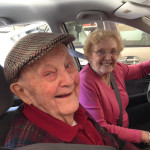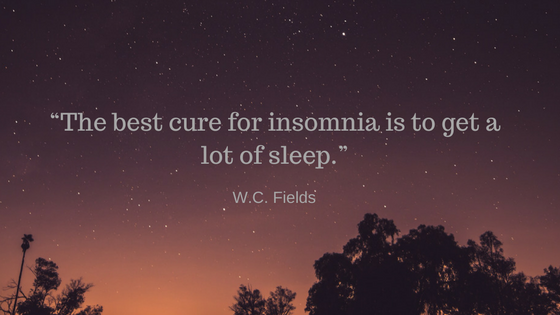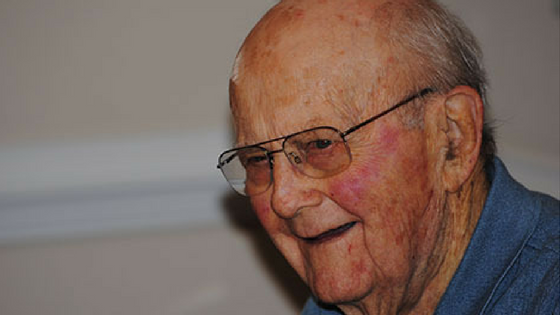American comedian and actor W.C. Fields once said, “The best cure for insomnia is to get a lot of sleep.” If only it was that easy! Many of us have endured nights in which sleep refuses to visit, and some of us have encountered sleeping difficulties for a prolonged period of time.
The adverse effects of insomnia are detrimental to the functioning of all people, but for the elderly, they are especially so. Without sufficient sleep, older adults may:
- Increase their risk for certain diseases, like diabetes or cardiovascular disease
- Have difficulty concentrating, and as a result, endanger their lives or the lives of others via car / domestic accidents
- If clinically depressed, worsen their condition
Why do seniors in particular tend to suffer from insomnia?
As we age, our circadian rhythm (the internal system which regulates our periods of sleepiness and wakefulness) can change, meaning that we tire in the early evening and wake in the early hours of the morning.
However, it’s important that we don’t conflate aging with insomnia; depending on the length of time an older person has had trouble getting an adequate amount of sleep, insomnia can indicate a more serious problem. If an older loved one is experiencing chronic sleep deprivation, make sure to consult a doctor.
Here are some tips that may help improve your or someone you love’s sleep:
- Move. A sedentary lifestyle requires little energy, and as a result, it may be harder to sleep at night. Aerobic exercise, dancing, or even walking at least three hours before you go to bed can refocus your mind and tire you out for a good night’s sleep.
- Refrain from drinking. This means no caffeine or alcohol in the evening, and no drinking a large amount of any fluid before bed. Many seniors can’t sleep because a full bladder wakes them up throughout the night; not only is this disruptive to their sleep cycle, but it can be dangerous, as they might fall in transit to or from the bathroom.
- Get some sun. If a senior spends the majority of their time indoors, make sure his or her rooms are well-lit in the daytime. Try to spend some time outside every day; the sunlight can help regulate your sleep cycle.
- Relax yourself before trying to sleep. Unwind with a book, listen to music, write in a journal or meditate. Don’t go to bed until you’re ready to fall asleep.
- Routine. A consistent set of pre-sleep practices can be extremely beneficial. Go to bed at the same time each night if you can, and perform the same hygienic tasks in the same order (brush your teeth then wash your face then comb your hair, etc.). Do something that you only do right before you go to bed, so that when you do it, your body will know it’s time to go to sleep (spray your pillow with a calming scent, turn off the light by your bed, say a prayer or a poem you’ve memorized, etc.).
- Cold, dark and quiet. Create the ideal sleeping environment by closing the curtains and turning the lights off. Turn a fan on or turn the heat off; it can be hard to fall asleep if you’re sweating under the covers! Turn off the radio and television. Without these distractions, your body and mind can relax.
- Think good thoughts. Anxiety and fear can keep us from getting the sleep we need. But if we don’t sleep well, how can we face the challenges the next day brings? As you get into bed, imagine that you’re sliding into a space where your problems and worries are suspended. There is a time to tackle tasks and difficulties, but it’s not during the middle of the night; the things that make you anxious will be there in the morning, so give tomorrow’s you a good start by getting the rest your body needs. Write a story in your head, keep a journal of your anxieties, and take long, deep breaths using your diaphragm. If anxiety regularly impacts your life, it may be beneficial to speak with a psychologist.
- Keep naps short and regular. It’s normal to burn out mid-afternoon, and if your body needs sleep, don’t feel bad about taking a nap. However, sleeping too much during the day can make you restless at night. To get the most out of your naps, keep them short (no more than 30 minutes) and take them in the afternoon (well before evening). If possible, set a time in your schedule for a daily nap, and then your body will adjust and your sleep at night won’t be affected.
The real difficulty of insomnia in older adults is that it can occur for a variety of reasons, some of which cannot be remedied via a change in lifestyle and sleeping habits. Pain from pre-existing medical conditions, gastrointestinal and continence issues, sleep apnea and certain medications can cause chronic sleep deprivation.
Depression has also been linked to insomnia in the older adult population.
If an older loved one is suffering from chronic insomnia, it’s important not to dismiss the condition as normal. Recent studies have shown that insomnia can be a symptom of depression in the elderly; to make matters worse, insomnia can also worsen clinical depression.
It’s difficult for families as seniors age to determine which of their bodily and behavioral changes are “normal.” There are certain ideas that we accept: that seniors will eat less, sleep less or understand less as a product of their age. And while the body undergoes significant transformations in its later years, these assumptions of normalcy may prevent our loved ones from receiving the proper treatment.
Insomnia is one of those issues that is, perhaps, taken for granted in the elderly. But we can’t dismiss this prevalent condition as normal or expected. At worst, being proactive in helping them with their insomnia can mean that the hours they do get sustain them; at best, it can bring to light other, even more serious conditions like depression, and they can get the therapy or treatment they need.
If an older loved one is experiencing chronic insomnia, consult a doctor; there are various medications and treatments that can be prescribed to help seniors get the sleep they need to function at their best.
Contributed by Meredith Kimple
 Two Bodies, One Person by Alan Millikan
Two Bodies, One Person by Alan Millikan

